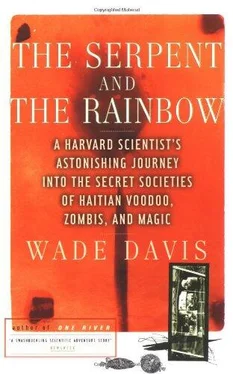Wade Davis - The Serpent and the Rainbow
Здесь есть возможность читать онлайн «Wade Davis - The Serpent and the Rainbow» весь текст электронной книги совершенно бесплатно (целиком полную версию без сокращений). В некоторых случаях можно слушать аудио, скачать через торрент в формате fb2 и присутствует краткое содержание. Год выпуска: 1985, Издательство: Simon & Schuster, Жанр: Старинная литература, на английском языке. Описание произведения, (предисловие) а так же отзывы посетителей доступны на портале библиотеки ЛибКат.
- Название:The Serpent and the Rainbow
- Автор:
- Издательство:Simon & Schuster
- Жанр:
- Год:1985
- ISBN:нет данных
- Рейтинг книги:5 / 5. Голосов: 1
-
Избранное:Добавить в избранное
- Отзывы:
-
Ваша оценка:
- 100
- 1
- 2
- 3
- 4
- 5
The Serpent and the Rainbow: краткое содержание, описание и аннотация
Предлагаем к чтению аннотацию, описание, краткое содержание или предисловие (зависит от того, что написал сам автор книги «The Serpent and the Rainbow»). Если вы не нашли необходимую информацию о книге — напишите в комментариях, мы постараемся отыскать её.
The Serpent and the Rainbow — читать онлайн бесплатно полную книгу (весь текст) целиком
Ниже представлен текст книги, разбитый по страницам. Система сохранения места последней прочитанной страницы, позволяет с удобством читать онлайн бесплатно книгу «The Serpent and the Rainbow», без необходимости каждый раз заново искать на чём Вы остановились. Поставьте закладку, и сможете в любой момент перейти на страницу, на которой закончили чтение.
Интервал:
Закладка:
Lehman’s grave dark face had changed; it was luminous, trembling. I found his excitement contagious. Yes, it was completely conceivable that a drug might exist which, if administered in proper dosage, would lower the metabolic state of the victim to such a level that he would be considered dead. In fact, however, the victim would remain alive, and an antidote properly administered could then restore him at the appropriate time. The medical potential of such a drug could be enormous … as Kline obviously appreciated.
“Take surgery,” he said. “Someone is about to have an operation. What do they want to be sure of?” Before I could reply, he said, “Their surgeon? They want to know that the surgeon is qualified, but the truth is that most surgery is absolutely routine. The real liability, the hidden danger that kills hundreds of patients every year, no one even thinks about.”
Lehman was restless, anxious to finish Kline’s thought, but Kline went on. “Anesthesia. Every time someone goes under, it is an experiment in applied pharmacology. The anesthesiologist has his formulae and his preferred chemicals, but he combines them on the spot, depending on the type of operation and the condition of the patient. Each case is unique and experimental.”
“And hazardous,” Lehman added. Kline held his empty brandy glass to the light.
“We cloak all uncomfortable truths in euphemism,” Kline said, moving back to the table toward me. “General anesthesia is essential, often unavoidable, always dangerous. That makes everyone, especially the physicians, uncomfortable. Hence we joke about getting knocked out, as if it were a straightforward procedure. Well, I suppose it is. Bringing someone back undamaged, however, is not.”
Kline paused. “If we could find a new drug which made the patient utterly insensible to pain, and paralyzed, and another which harmlessly returned him to normal consciousness, it could revolutionize modern surgery.”
It was my turn to interrupt. “And make somebody a lot of money.”
“For the sake of medical science,” Lehman insisted. “That’s why it behooves us to investigate all reports of potential anesthetic agents. We must have a close look at this reputed zombi poison, if it exists.”
Kline moved across the room like a man at odds with something more than himself. “Anesthesis is only the beginning. NASA once asked me to consider the possible application of psychoactive drugs in the space program. They would never admit it, but basically they were concerned with how they were going to keep the restless astronauts occupied during extended interplanetary missions. This zombi poison could provide a fascinating model for experiments in artificial hibernation.”
Lehman looked at Kline impatiently. “What we want from you, Mr. Davis, is the formula of the poison.” The bluntness of his statement, however expected, pushed me back from the table, and I turned my back on them both, stepping toward a sliding glass door, until I felt myself caught like a fly in the cross mesh of their gaze.
I turned back to them. “What about contacts?”
“We will be touch with Douyon. And perhaps you should call the BBC and speak with their correspondent.”
“That’s it?”
“That’s all we know.”
“And my expenses?”
“We have a small fund put aside. Just send us the bills.”
There was nothing more to ask. They were like two major currents, Kline torrid and surging, Lehman passive and subdued; they had come together, determined to act. My assignment as outlined succinctly by Kline was to travel to Haiti, find the voodoo sorcerers responsible, and obtain samples of the poison and antidote, observing their preparation and if possible documenting their use.
As I went out the apartment door, Kline handed me a sealed manila envelope, and it was then I realized that they had assumed all along that I would take the assignment. I didn’t look back, even as I heard their voices continuing behind me.
Kline’s daughter Marna caught up with me in the lobby. It was late, and I walked her back to her Sixty-ninth Street studio. Outside on the streets a thin drizzle had turned the pavement to pools of yellow light. The storm had passed and the city once again carried its own sounds. Marna hadn’t said anything during the meeting, and she didn’t speak now. I asked her about a photograph I had noticed in the apartment, of a frail white-haired man sitting at a desk, reaching a hand across a pair of ivory-handled revolvers.
“François Duvalier. Eugene Smith took it when he and my father were in Haiti.”
“Your father knew Papa Doc?”
She nodded.
“How?”
“When they set up that institute where Douyon has the zombis. The one named after him.”
“After Duvalier?”
“No,” she said with a laugh, “my father. He’s been going to Haiti for twenty-five years.”
“I know. Ever go with him?”
“Yes, all the time, but …”
“Like it?”
“Sure, it’s wonderful. But listen, you ought to understand something. He really believes zombis exist.”
“You don’t.”
“That’s not the point.”
Outside her apartment house, an empty cab approached and I hailed it. We said goodnight. It was hours past the last air shuttle, so I directed the cabbie to Grand Central Station and waited for the night train to Boston. Once on board, I opened the envelope that Kline had given me. Besides money and an airplane ticket there was one Polaroid photograph, a dull image of a poor black peasant, whom a note identified as Clairvius Narcisse. I found myself cradling his face in my hand, astonished how a mere photograph could make the exotic seem intimate. I still held it as the train pulled out, and then finally I glanced at the airline ticket. I had one week to try to piece together a biological explanation that would fit the limited data.
3
The Calabar Hypothesis
I ENJOY TRAINS, and in South America whenever possible I rode them, sitting on the open ends, savoring the waves of tropical scents that the passage of the train whipped into an irresistible melange. By comparison to those creaking Latin caravans, so alive in human sweat and wet wool, smelling of a dozen species of crushed flowers, American trains are sadly sterile, with a heavy atmosphere that makes the air taste used. Still, the rhythm of the rails is always seductive, and the passing frames race by like so many childhood fantasies, alive in color and light.
But leaving New York, it was not to the train that I owed my strange sense of release. I questioned my reflection in the train window, puzzled by a range of inexpressible feelings and ideas. “The frontier of death”—it was that phrase of Lehman’s that haunted me most, pulling me back from the borders of sleep, leaving me alone in an empty train car measuring the passing night by the periodic shuffling of the conductor’s feet.
Kline and Lehman. I weighed their words, groping for hidden meanings or clues, but kept returning to the bare facts of the case. These did not tell me much, but they were enough to get started, and, moreover, they mercifully grounded my imagination.
A poison sprinkled across a threshold was presumably absorbed through the feet. If true, this implied that its principal chemical constituents had to be topically active. From descriptions of the wandering zombis, it appeared likely that the drug induced a prolonged psychotic state, while the initial dose had to be capable of causing a deathlike stupor. Since in all likelihood the poison was organically derived, its source had to be a plant or animal currently found in Haiti. Finally, whatever this substance might prove to be, it had to be extraordinarily potent.
Читать дальшеИнтервал:
Закладка:
Похожие книги на «The Serpent and the Rainbow»
Представляем Вашему вниманию похожие книги на «The Serpent and the Rainbow» списком для выбора. Мы отобрали схожую по названию и смыслу литературу в надежде предоставить читателям больше вариантов отыскать новые, интересные, ещё непрочитанные произведения.
Обсуждение, отзывы о книге «The Serpent and the Rainbow» и просто собственные мнения читателей. Оставьте ваши комментарии, напишите, что Вы думаете о произведении, его смысле или главных героях. Укажите что конкретно понравилось, а что нет, и почему Вы так считаете.












